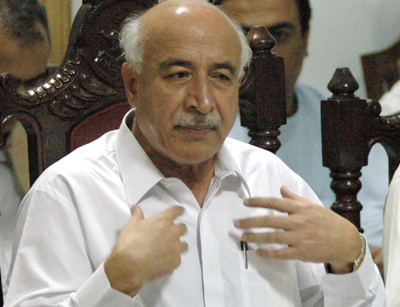Usman Raza Jamil
With reference to your press conference of December 11 and subsequent news reports whereby you had categorically denied that no ‘deal’ was being struck with Tethyan Copper Company (TCC) or any foreign company by the government of Balochistan on the future of Reko Diq copper and gold reserves, the following questions relating to the single largest natural resource located in the Subcontinent are being raised on behalf of the citizens of Pakistan.
It is settled law in Pakistan that matters involving questions of criminality and public policy cannot be referred to arbitration. Then why are representatives from the provincial and federal governments reportedly negotiating with TCC?
And more importantly, why have the provincial and federal governments submitted to the jurisdiction of the foreign arbitration tribunals? Are the jurisdictions of the foreign arbitration tribunals superior to those of our courts? The alleged enforcement being sought by TCC is under agreements which are subject to the respective governments working under the laws of Pakistan.
The clear constitutional position is that there was nothing to negotiate. The respective governments were duty bound to act in accordance with the constitution in a transparent and competitive mode as laid down by the Honourable Supreme Court because in this case, the respective governments have decided not to undertake the exploration, mining and smelting itself and invest no money of its own and so far, none of the respective governments are taking any money as a loan from a foreign country in the form of a tied loan.
The future of the potential of Reko Diq and District Chagai may only be protected through open, transparent and international tendering. But instead, the provincial government is avoiding bidding and resorting to unconstitutional negotiations, which can only damage the valuable future of Pakistan.
Why are we not following what Afghanistan has done in the case of the Qara Zaghan gold mines, which is a continuation of Reko Diq in Afghanistan? In that case, the people of Afghanistan were the sole beneficiaries in the long term through the open competitive bidding procedure and terms of agreement signed by Afghanistan under the guidance of the present president of Afghanistan.
The documents relating to the case of the Qara Zaghan Gold Mines were brought from Afghanistan, placed on the record of the Honourable Supreme Court of Pakistan and which were approved by the Supreme Court in its judgement dated January 7, 2013. Why has Pakistan not applied to become a member of the EITI (Extractive Industries Transparency Initiative), whereby global mining contracts are subjected to the highest levels of transparency international best practices?
It was noted with great concern by the Honourable Supreme Court that the relevant members of the bureaucracy of the government of Balochistan at the time of the signing of the CHEJVA in 1993, themselves did not know the consequences of what they were giving away to foreign entities. The additional chief secretary of Balochistan, while forwarding a summary for the approval of the execution of the CHEJVA in 1993 to the then chief minister of Balochistan wrote:
“Few people in the government really know what the GOB is getting into in the agreement. Agreed that BHP is a good party, mineral exploration in the area is highly desirable but the GOB has to be mindful of its interest specially the possible reaction of the people of the area to a large tract of land being reserved for BHP”
Why have the provincial and federal governments, for the last 24 years, been blinded by their own petty self-interests in the matter of Reko Diq and Chagai Hills natural resource reserves? It is estimated that no more than $40 million have been spent by interested parties in Reko Diq on corruption. Why has the provincial government been consistently so incompetent that its corruption rates are so low and petty? The damage being caused to Pakistan owing to the non-development of the single largest natural resource reserve in the Subcontinent is incalculable. Why has the provincial government been keeping everything (all documents and details regarding this huge mineral wealth) secret?
Surely, it is in public interest to safeguard the sanctity and future of the potential of our country. If anything, the provincial and federal governments should have been encouraged by the fact that TCC’s claims for interim relief were summarily dismissed by both ICSID and ICC. By submitting to the jurisdiction of the International Arbitration Tribunals and through forwarding reported summaries and holding discussions for negotiations in countries outside of Pakistan, such actions by the chosen officials of the respective governments are contrary to public interest, the constitution and effectively against the judgement rendered by the Supreme Court.
We cannot let foreign companies and governments spread panic amongst our people with threats of having to be liable for billions of dollars of damages. We, the citizens of Pakistan, implore you to be steadfast to further protect the future of our children. Simply put – this time around, we have to be more competent; we have to be transparent and most of all, we must put the future of Pakistan ahead of our own self-interests.
The writer is an advocate and has been closely associated with the conduct and preparation of the case relating to Reko Diq before the Honorable Supreme Court of Pakistan. Email: usmanrjamil@gmail.com
Courtesy: The News
Published in The Balochistan Point on December 23, 2014
Disclaimer: Views expressed in this article are those of the author and The Balochistan Point not necessarily agrees with them.
 Balochistan Point Voice of Nation
Balochistan Point Voice of Nation




